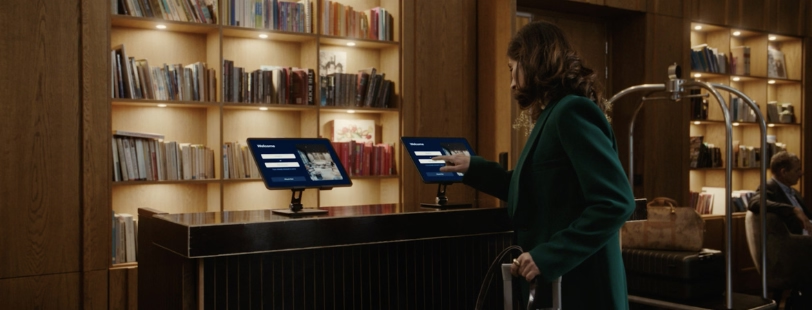
Self-Service Kiosks vs. Front Desk: The Future of Hotel Check-Ins
The hospitality industry is evolving rapidly, and the debate over self-service kiosks vs. front desk check-ins has become increasingly relevant. As hotels strive to provide seamless experiences for guests, the traditional front desk model is being challenged by modern self-service technology. But which option truly defines the future of hotel check-ins?
In this article, we examine the advantages, limitations, and future potential of both approaches to help you decide which method aligns with the expectations of today’s travelers.
The Challenges of Modern Hotel Check-Ins
Today’s guests demand convenience, speed, and personalization. However, traditional front desk check-ins often fall short due to several pain points:
- Long Wait Times: Guests arriving during peak hours frequently encounter delays.
- Limited Flexibility: A rigid check-in process may not suit travelers arriving late at night or early in the morning.
- Human Error: Mistakes in data entry, room assignments, or billing can lead to customer dissatisfaction.
Self-service kiosks, on the other hand, aim to address these challenges with advanced technology. However, can they entirely replace the personal touch of front desk staff? Let’s explore both sides.
Advantages of Self-Service Kiosks
Self-service kiosks are becoming a cornerstone of modern hospitality, offering a range of benefits that cater to tech-savvy travelers.
1. Speed and Efficiency
Kiosks allow guests to bypass long queues and complete check-ins within minutes. With user-friendly interfaces, they guide users through the process effortlessly, from room selection to payment. According to recent studies, 65% of travelers prefer faster check-in processes, which self-service kiosks can deliver.
2. 24/7 Availability
Unlike front desk staff, kiosks are operational around the clock, making them ideal for guests arriving at odd hours. This round-the-clock accessibility enhances convenience and reduces stress for travelers with unpredictable schedules.
3. Cost-Effectiveness for Hotels
By automating repetitive tasks, hotels can allocate resources more efficiently. Staff can focus on value-added services such as personalized guest engagement rather than routine check-in duties.
4. Multilingual Support
Self-service kiosks often come equipped with multilingual capabilities, catering to international travelers. This feature ensures smoother communication and eliminates language barriers during the check-in process.
Limitations of Self-Service Kiosks
Despite their benefits, self-service kiosks are not without drawbacks.
1. Lack of Human Interaction
For guests seeking a warm welcome or those requiring personalized assistance, kiosks may feel impersonal. A lack of human touch can detract from the overall guest experience, especially for first-time visitors.
2. Technical Issues
Kiosks, like any technology, are susceptible to malfunctions. Connectivity issues, software glitches, or hardware failures can disrupt the check-in process, potentially leading to frustration for guests.
3. Accessibility Challenges
Not all guests are comfortable navigating a kiosk, particularly older travelers or those unfamiliar with digital interfaces. This limitation highlights the importance of providing alternative options for different user demographics.
The Enduring Role of the Front Desk
While self-service kiosks have gained traction, the traditional front desk remains an essential component of the hotel experience for several reasons.
1. Personalized Guest Service
Front desk staff play a pivotal role in creating a welcoming atmosphere. From recommending local attractions to accommodating special requests, their ability to connect with guests on a personal level is unmatched.
2. Handling Complex Situations
When issues arise—such as reservation discrepancies or room upgrades—trained staff can resolve them efficiently. Guests value the problem-solving capabilities of experienced front desk personnel, which kiosks cannot replicate.
3. Building Brand Loyalty
Human interaction fosters emotional connections. A friendly conversation at check-in can leave a lasting impression, encouraging guests to return and recommend the hotel to others.
 Striking the Perfect Balance: Combining Technology with Human Touch
Striking the Perfect Balance: Combining Technology with Human Touch
The future of hotel check-ins does not rest solely on self-service kiosks or front desks. Instead, it lies in a hybrid model that leverages the strengths of both approaches. Hotels can achieve this balance by implementing strategies such as:
- Offering Choice: Allow guests to choose between kiosk check-ins and traditional front desk services, catering to varying preferences.
- Integrating Mobile Technology: Pair self-service kiosks with mobile apps for an enhanced digital experience. Guests can check in via their smartphones while still having access to staff for assistance.
- Staff Augmentation: Use kiosks to handle routine tasks while staff focus on delivering personalized service.
Case Studies: Hotels Leading the Way
1. Marriott International
Marriott has rolled out self-service kiosks across its properties, enabling guests to check in, access digital keys, and customize their stay preferences. Their approach combines technology with always-available staff support for complex queries.
2. Yotel
Yotel’s fully automated check-in kiosks have redefined efficiency, allowing guests to check in and out independently. Meanwhile, their “Crew Members” are always on hand to provide assistance, blending automation with personal service.
The Future of Hotel Check-Ins
The debate between self-service kiosks vs. front desk check-ins will likely continue as technology evolves. However, the ultimate winner is neither the machine nor the human—it is the guest. Hotels that prioritize flexibility, convenience, and exceptional service, regardless of the method, will stay ahead of the curve.
The rise of AI-powered kiosks, biometric authentication, and mobile integration suggests that technology will play an even greater role in the future. Yet, the enduring importance of human connection ensures that front desk staff will remain an integral part of the hospitality landscape.
Conclusion: Meeting Guest Expectations in a Digital World
The choice between self-service kiosks vs. front desk is not about replacing one with the other but rather about meeting the diverse needs of today’s travelers. By embracing innovation while preserving the essence of hospitality, hotels can create a check-in experience that is not only efficient but also memorable.
For those in the hospitality industry, the challenge lies in striking the right balance. And for travelers, the future promises a seamless blend of technology and personalized care.











